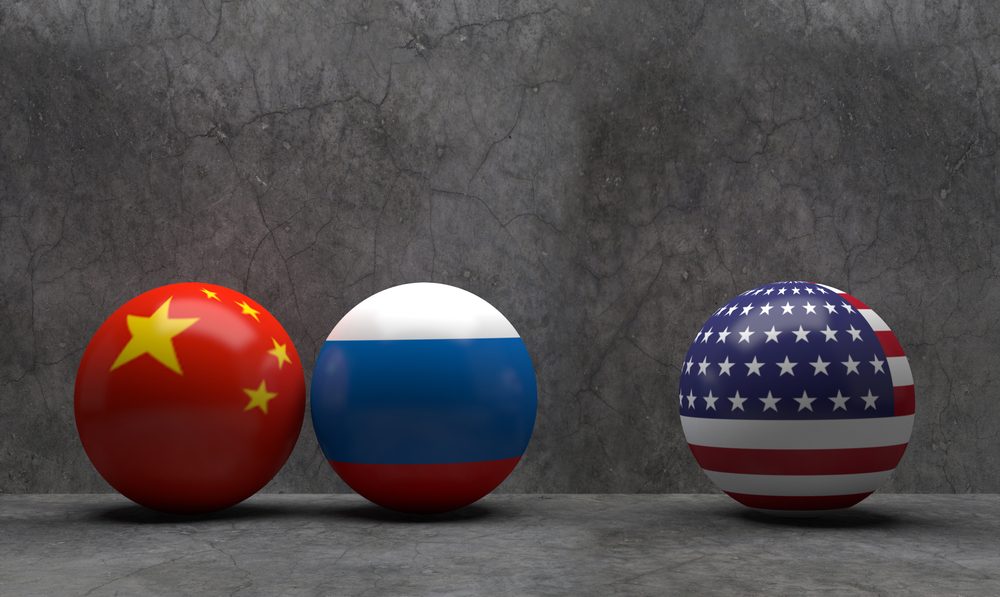Chinese President Xi Jinping and Russian President Vladimir Putin met on the 4th of February, ahead of the opening ceremony for the Beijing Winter Olympics, to highlight growing cooperation between the two countries, and demonstrating a united front on regional and global issues. The two leaders declared a “no limits” partnership, and support for each other, including over Ukraine – amidst Russia’s escalating crisis with the US and NATO- as well as over Taiwan, which has been receiving support from the West, in the face of Chinese violation of its airspace.
The stance displayed by China and Russia underscores a strategy of rivalry with the US, and a return of great-power competition in the Indo-Pacific region and Europe. This competition is expected to extend to the Middle East, where China and Russia are expected to seek to take advantage of declared US withdrawal, and reduced engagement with conflicts and crises in the region. As their common interests converge, China and Russia are expected to expand their political, military, and economic engagement in the region.
The US can therefore no longer be considered the primary global power with a strong presence in the Middle East, in view of increased Russian and Chinese involvement in the region. This is illustrated by Russia’s military engagement in Syria and Libya, growing Chinese economic and technological investments in the region, and the rise in arms sales to regional countries by both Russia and China. Enhanced cooperation between Russia and China is likely to have an impact on their policies in the region, with a number of consequences, including:
Strengthening the triple-axis (Iran, China and Russia): The recent agreement between Moscow and Beijing will strengthen the three-way alliance between Iran, China and Russia, which has seen developments over the past months. This was illustrated by the third round of joint drills, dubbed the 2022 Maritime Security Belt, held on 21 January. Launched in 2019, this undertaking is a joint naval exercise north of the Indian Ocean aimed at promoting cooperation and mutual security among the three states.
Since taking office last August, Iranian President Ebrahim Raisi’s “heading East” strategy has furthered relations with Russia and China, confirmed by Tehran’s admission into the Shanghai Cooperation Organization – an Asian security entity led by Beijing and Moscow- last September. During a visit to China on January 15 this year, Iranian Foreign Minister Hossein Amir-Abdollahian announced the launching of the 25-year cooperation agreement with China amounting to USD400 billion. The agreement had been signed a year earlier by China’s Foreign Minister Wang Yi and Iran’s former Foreign Minister Mohammad Javad Zarif. Iranian President Ebrahim Raisi’s visit to Moscow on January 19 was designed to strengthen Iran’s position in the Vienna negotiations .
Maintaining strong Chinese, Russian relations with all regional parties : Russia and China agree on the need to maintain steady relations with all influential actors in the Middle East, and to avoid siding with parties in conflict. They also agree on adopting a cautious approach regarding involvement in the region’s disputes and domestic affairs. Moscow and Beijing therefore adopt a cooperative approach towards all states in the region, whereby they both maintain strategic relations with Iran, and economic and security ties with Israel, despite escalating tensions between these two regional states.
Maintaining the policy of non-interference in domestic affairs: As both Russia and China reject US and Western criticism of their own regimes, they have adopted a stance that is critical of western interference in the domestic affairs of Middle East countries. Both countries have expressed this stance in official statements, especially in reference to regional allies, such as Iran. This principle of “non-interference” relieves China and Russia from taking sides in controversial regional developments.
Avoiding contradictions in their regional policies: Both Russia and China are seeking to strengthen their military influence in the region, through increasing their share of arms sales, as well as through the military presence of Russian forces in Syria and Libya, and Chinese forces in Djibouti. Currently, Russia and China are working to reduce sources of potential disagreement, by each focusing on different objectives. Russian military presence in the Middle East seeks to emphasize Russian strength, and Russia’s ability to counter US military power. On the other hand, Chinese military presence is focused on securing the freedom of maritime navigation, and ensuring that oil supplies from the region, necessary for economic growth, reach China. There is of course potential military cooperation between the two countries, as illustrated by the joint drills with Iran that began in December 2019 near the Strait of Hormuz.
Refraining from Challenging the US-led security order in the Middle East: Despite intense rivalry between the US on one hand, and China and Russia on the other, it is not in the interest of Moscow and Beijing to challenge the US-led security order in the region. US commitment to the security and stability of the region has laid the groundwork for China and Russia to increase their economic and political relations with allies in the Middle East without incurring the cost of securing these interests.
However, it can be argued that although Russia and China have adopted similar and non-contradictory policies towards the Middle East, there remain obstacles to closer cooperation between them in the future. Russia, for example, has concerns regarding growing Chinese influence and aspirations in Central Asia – Russia’s historical sphere of influence. It is possible that bilateral cooperation in the Middle East could eventually give way to growing competition between Russia and China , especially in the event of further US disengagement from the region, and both powers compete to fill the vacuum this would create.


